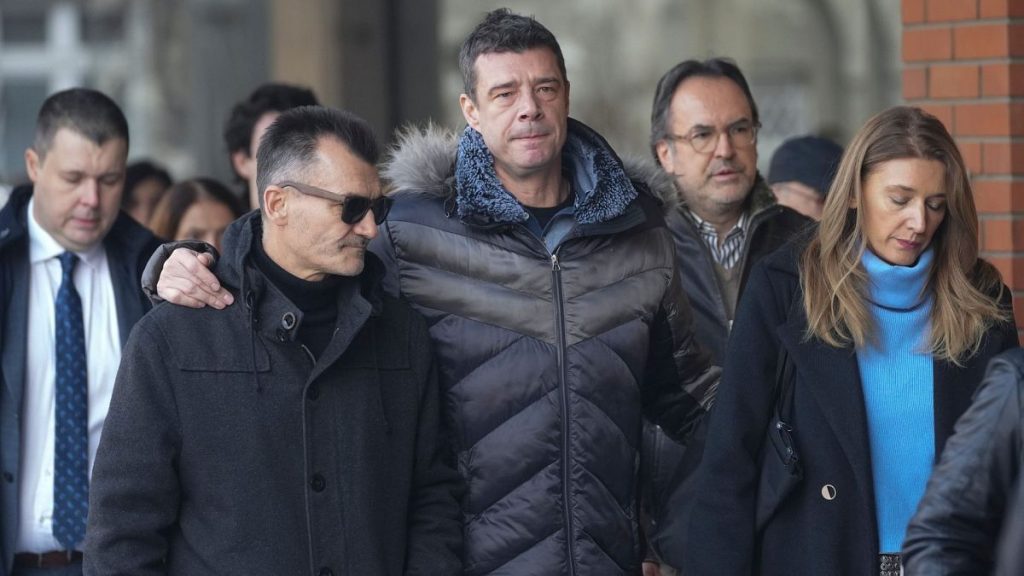The tragic school shooting at Vladislav Ribnikar primary school in Belgrade, Serbia, on May 3, 2023, reverberated through the nation and sparked a wave of grief, anger, and demands for justice. A 13-year-old boy, Kosta Kecmanovic, armed with his father’s unsecured firearms, opened fire in the school hallway and a classroom, killing nine students and a security guard. The unimaginable act shook a country with no prior history of such devastating school violence, leaving deep scars on the community and raising profound questions about parental responsibility and gun control. The ensuing legal proceedings focused on the parents of the young shooter, seeking to determine their culpability in the tragic events that unfolded.
The Higher Court in Belgrade delivered its verdict on Monday, finding Vladimir Kecmanovic, the boy’s father, guilty of “grave acts against public safety” and child neglect. He received a sentence of 14 years and six months in prison. The court determined that his negligence in securing his firearms played a significant role in enabling his son to carry out the massacre. Miljana Kecmanovic, the boy’s mother, was convicted of child neglect and sentenced to three years in prison. She was, however, acquitted of charges related to the illegal possession of weapons. The court recognized a level of parental responsibility for failing to adequately supervise and protect their child, which ultimately contributed to the horrific outcome.
The shooter himself, Kosta Kecmanovic, was too young to face criminal charges under Serbian law. He remains in a specialized institution where he is receiving psychiatric care and evaluation. His testimony, given during his parents’ trial, offered chilling insights into his mindset and the events leading up to the shooting. The trial itself was largely closed to the public, with only the reading of the verdict open to media and attendees, reflecting the sensitivity and complexity of the case. While the court’s decision aimed to assign responsibility for the tragedy, it also underscored the difficult legal terrain when dealing with juvenile offenders and the complex interplay of parental accountability.
The verdict, while anticipated given the immense public pressure and expectation for justice, did not satisfy all of the victims’ families. Some expressed disappointment that no one was directly held accountable for the murders themselves, highlighting the challenging legal predicament presented by the shooter’s age. The sentiment reflects the immense grief and the search for answers and accountability in the face of unimaginable loss. The legal proceedings focused on the failings of the parents, while the ultimate responsibility for the heinous act remained attributed to a minor legally incapable of standing trial for murder.
The Vladislav Ribnikar school shooting was not an isolated incident. Just a day later, another mass shooting occurred near Belgrade, further deepening the nation’s trauma and prompting widespread protests. In this second incident, a 21-year-old gunman, Uroš Blažić, killed nine people and injured 12 others using an automatic rifle. He was subsequently sentenced to 20 years in prison. These back-to-back tragedies sparked a national debate on gun control and led to a government crackdown on illegal gun ownership, highlighting the urgent need for legislative action to prevent further tragedies.
The two mass shootings served as a stark wake-up call for Serbia, forcing the nation to confront its lax gun laws and the underlying societal issues that may contribute to such violence. The government’s response, including a campaign to encourage citizens to surrender unregistered firearms, signaled a recognition of the urgent need for greater control over weapons. The tragedies also fueled public discourse on mental health, parental responsibility, and the broader societal factors that can lead to such extreme acts of violence. The aftermath of the shootings represents a pivotal moment in Serbia’s history, prompting a national reckoning with issues of gun control, public safety, and the need for preventative measures to address the root causes of violence.














